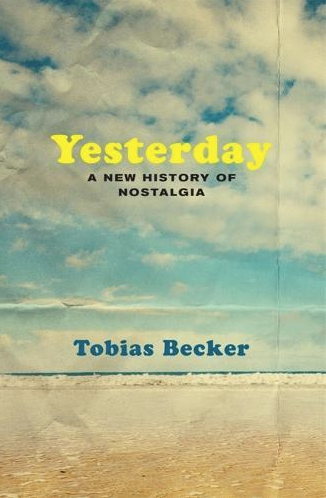Review: Yesterday – a New History of Nostalgia, Tobias Becker
There’s an American pop band, The Midnight, who are part of a ‘retrowave’ subculture that aims to recreate the feel of 80s pop music, with its pulsing synthesisers and naïve neon graphics. The Midnight explicitly refer in their promotional material to the Japanese phrase mono no aware, which they translate as ‘an aching awareness of impermanence’. This seems to me to be a reasonable description of the bittersweet feeling of nostalgia.
The term ‘nostalgia’ used to be synonymous with ‘homesickness’ but has come to mean missing a particular time rather than a particular place. The difference in the two, of course, is that with nostalgia, we can’t go back, unlike, in some cases, homesickness. The irretrievable past is a tautology, and our memory is tainted with the loss.
Tobias Becker interrogates meanings and applications of the word in his recent history, but, curiously enough, with some of the examples he uses – Victorian England, the Middle Ages – he ends up deciding the word is a slippery one and is overused (or at least misused).
The use of the term ‘nostalgia’ as a selective, rose-coloured remembering is often a term of abuse, though we might find hints of the feeling in the Romantic movement, even in Greek classics and the Bible. Historians tend to complain about nostalgia being selective, but all remembering must be necessarily selective.
The first panic over nostalgia seemingly occurred in the 1970s, where everything seemed to be shaken up. Then, the focus was the 1950s, a supposedly more stable period. There was even a series of revival concerts showcasing the early years of rock’n’roll. Later, in the 1990s, as cultural critic Chuck Klosterman notes in his history of the 90s, there was nostalgia for the 70s, when things seemed to be more carefree. Inevitably, into the new century there was nostalgia for the 1980s.

Nostalgia is criticised as an escape into the past to avoid the turbulent present, a reaction to modernity. Progress and nostalgia go together, as force and counterforce, and critics often point to nostalgia being a conservative quality. We don’t usually think of nostalgia as applying to a time when life was more complicated, yet one can be nostalgic for a more liberal and equitable time.
As Becker points out, nostalgia can be conflated with ‘retro’, but it may be helpful to think of retro as lacking that bittersweet feeling associated with nostalgia. Retro too is characterised by its difference from the present, but it is largely about irony and fun, and therefore difficult to criticise, rather than a wistful longing (which is the dictionary definition of nostalgia). It is possible, though, that irony can lead to longing, as may have happened with attitudes to the 80s, which have developed from interest in the 80s’ over-the-top quirkiness to a fondness for what now seems a simpler time.
I tend to think of nostalgia as related to, say, reminiscences of one’s childhood, but Becker writes about the explosion of interest in historical reenactments, preservation societies and investigations into family history, which can be sometimes criticised as overly nostalgic. In these cases, can we be nostalgic for a past we haven’t lived through? While Becker is sceptical of overuse of the word, it seems that it may be possible, if we feel a distant era had qualities that today lacks.

In that case, can nostalgia be a positive? Could a longing for the past tell us something about the present that needs to be reoriented? The church can be accused of nostalgia, but it’s possible that rather than being an unfulfillable desire to return to the past and a downplaying of problems in the past, a selective remembering of what made the church good might prompt us to work on bringing those aspects back to the present, just like how nostalgia for 80s music has brought back neon typefonts.
Nick Mattiske blogs on books at coburgreviewofbooks.wordpress.com and is the illustrator of Thoughts That Feel So Big.













